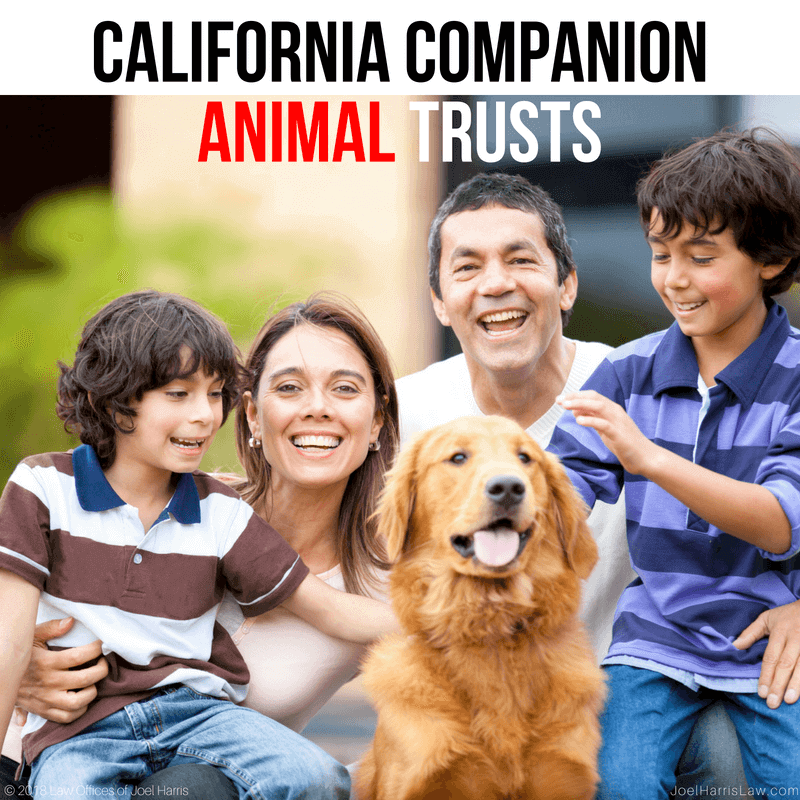California Companion Animal Trusts

A pet trust is a legally sanctioned arrangement providing for the care and maintenance of one or more companion pets in the event of a grantor’s disability or death. The “grantor” (also called a settlor or trustor in some states) is the person who creates the trust, which may take effect during a person’s lifetime or at their passing. Typically, a trustee will hold property (cash, for example) “in trust” for the benefit of the grantor’s pets. Payments to a designated caregiver(s) will be made on a regular basis. (ASPCA)
Are You Asking Yourself “How Can Care be Provided to My Pet When I No Longer Can?”
Thinking Ahead
It’s never pleasant to think about one’s own passing or catastrophic health problems, but the only way to ensure your animal’s future is to make arrangements before tragedy strikes. Cats and dogs can live up to 20 years or more so depending on your own age, your companion could outlive you. Even if you’re young, you could still fall victim to an accident or illness. In the U.S., animals can be fully protected in one of two ways: a “Pet Trust” or a “Companion Animal Trust.” While there are other options, (Pet trusts in California are typically included in your living trust) AnimalWellness recommends these are the best options for your pet. Both go into effect immediately upon your passing or disability and ensure that your companion will receive proper care for the remainder of their days.
Choosing Your Plan
There are many ways to assure yourself that your animal will receive the appropriate care after your death. One option, like a will, are not recommended due to many inherent problems. AmericanBar provides a detailed list on why to avoid a will for your pet’s care. Instead consider a Pet Trust or Companion Animal Trust; they are better suited because of the ability to contain all the relevant options for your fur-baby’s care. It’s a simple, legally binding document that covers everything from naming a guardian to the pet’s day-to-day routine, to what funding will be provided, and they’re valid in all 50 states. According to AnimalWellnes, The Companion Animal Trust kicks in immediately when you find yourself unable to care for your pet because of death, injury or illness. There is no waiting period or court involvement.
Approaching the Trust Like a Love Letter
Think of the trust as a document of affection and protection. So consider your pet’s daily routines, favorite treats and personal history. Many ideas for the specifics of a pet trust will spring from your close knowledge of your pet. These details in turn, can help establish an adequate level of care. According to VetStreet, by describing the specifics of your current pets, you can also cover the needs of other pets that you might have in the future. The wording should read, ‘This is the standard of care that I want for my animal.’ The emotion you bring to it, the way you treat your animals now, can be the same for later pets. The next time that you’re going through the motions — feeding your cats, taking your dogs for a walk — make a precise list of what you’re doing. What time do your dogs usually go to the park? Does your cat get a specific brand of treats? Do you scratch their ears when they lie down for a nap? Whatever may be second nature to you could be helpful information for a future caregiver.
Are You Ready To Assure Your Companion Receives Appropriate Care For Life?
Lifetime care planning for pets doesn’t have to be complicated, expensive, or overwhelming. That’s why at The Law Offices of Joel A Harris, we offer the best guidance for animal trusts catered to your individual needs. Throughout the process, we explain everything and patiently answer every question you may have. Since 1993, The Law Offices of Joel A Harris has worked tirelessly to assure individuals receive the most beneficial Animal Trusts for their companions. We love our pets too! Feel free to reach out to us at (925)757-4605.
Sources
- Animal Wellness, Barbara Nefer https://animalwellnessmagazine.com/setting-up-pet-trust/
- ASPCA https://www.aspca.org/pet-care/pet-planning/pet-trust-primer
- American Bar, Rachel Hirschfeld https://www.americanbar.org/newsletter/publications/gp_solo_magazine_home/gp_solo_magazine_index/petestateplanning.html
- LifeHacker, Dave Greenbaum https://lifehacker.com/set-up-a-financial-trust-for-your-pet-if-you-die-no-se-1656070383
- vetStreet, Jennifer Paull http://www.vetstreet.com/our-pet-experts/5-innovative-ideas-for-owners-who-want-to-set-up-pet-trusts
- Whole Dog Journal, CJ Puotinen https://www.whole-dog-journal.com/issues/15_4/features/Setting-Up-A-Pet-Trust_20495-1.html
